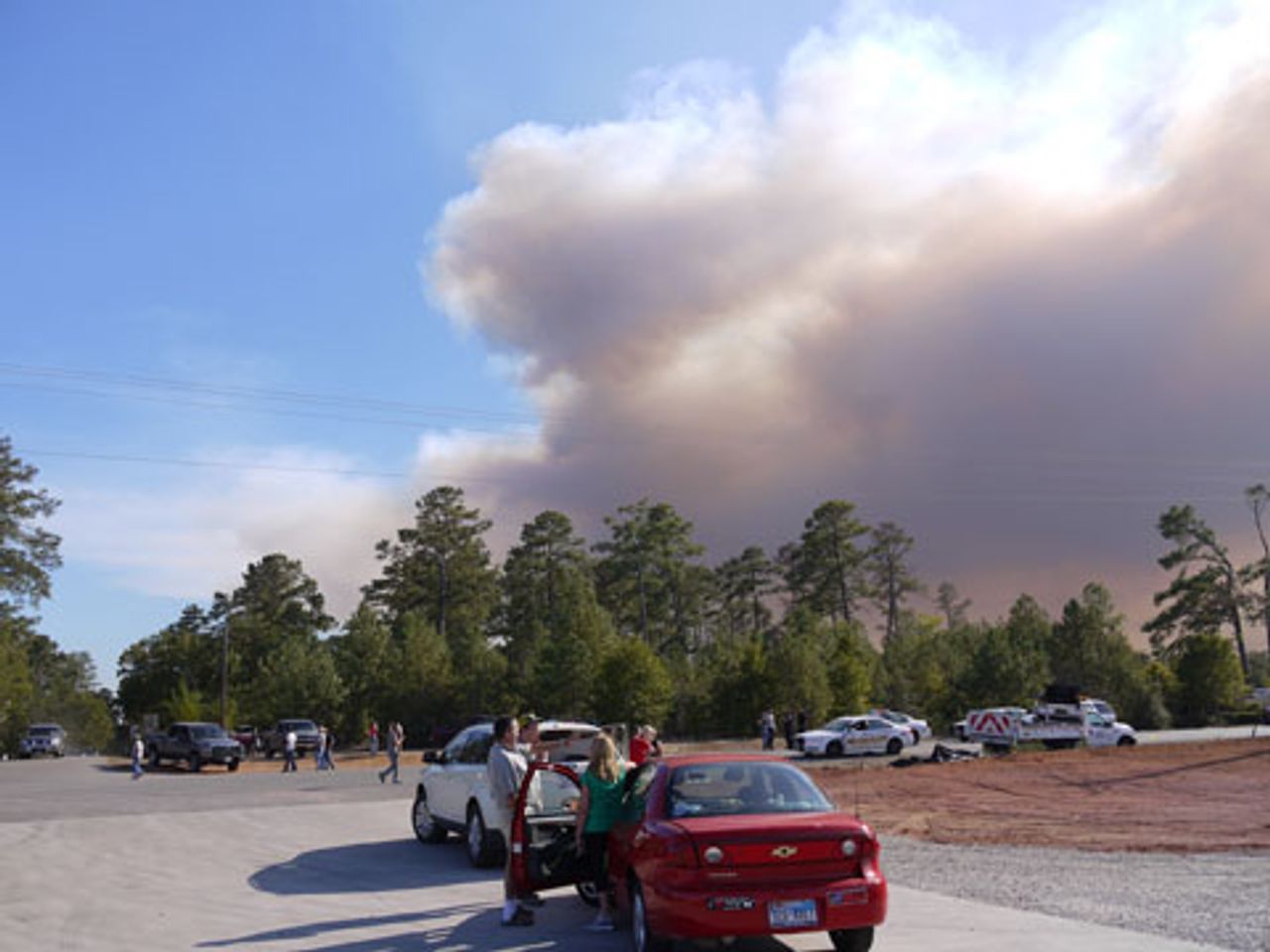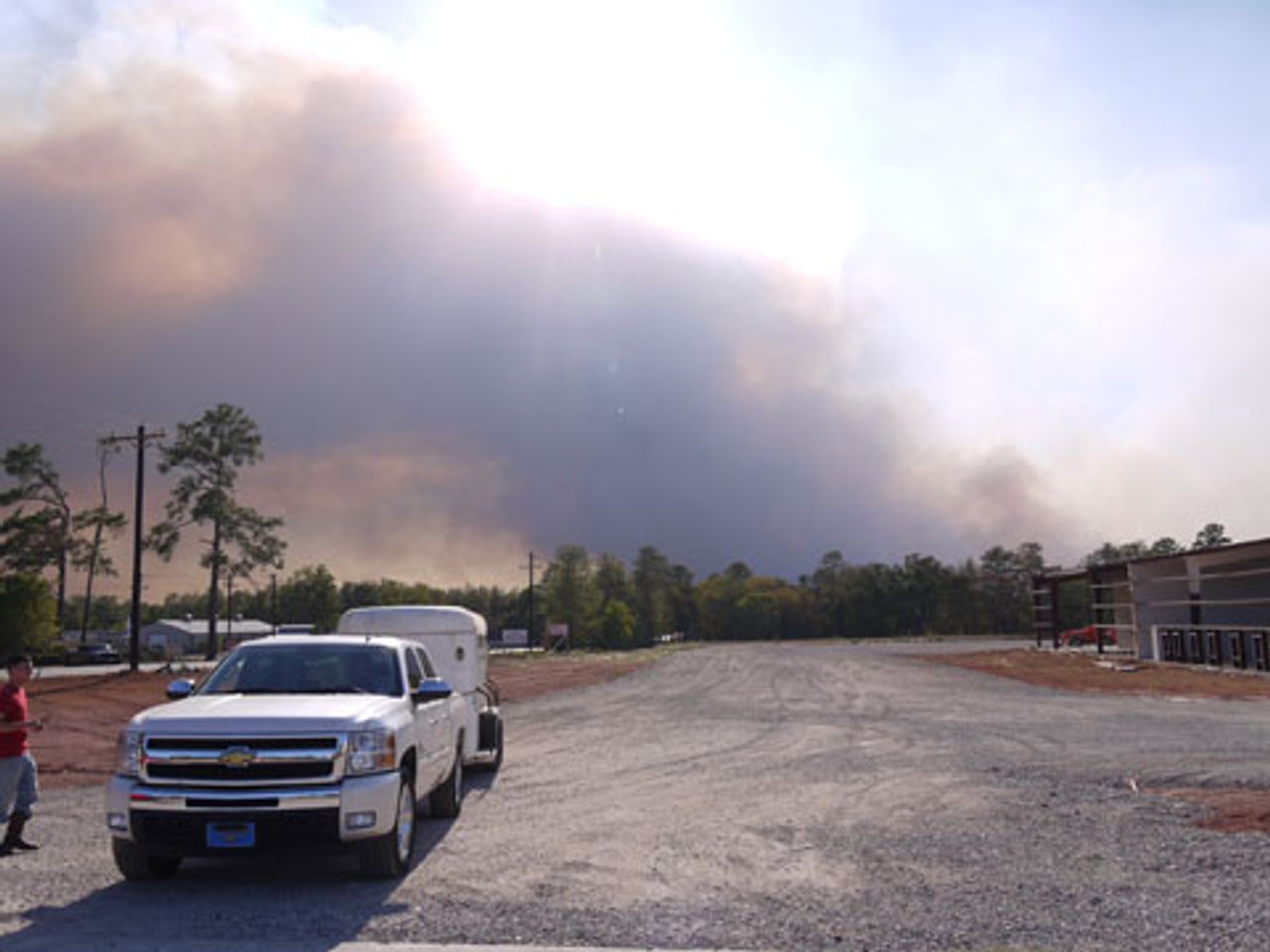 Local onlookers at the Riley Road fire in Montgomery County, Texas
Local onlookers at the Riley Road fire in Montgomery County, TexasWildfires, historic in scope, are devastating rural and small-town households across the state of Texas.
Texas has languished for months with the lowest rainfall in all of its recorded history, as well as unprecedented high temperatures. Under these conditions, vast numbers of dangerous, independent wildfires have flared up that now threaten countless homes and workplaces (see “Historic heat wave and drought in southwestern US“).
As of September 5, Texas wildfires had burned a staggering 3,582,000 acres so far this year. With the profusion of fires by no means contained, this number is expected to increase substantially over the coming months.
As is always the case with such disasters, the burden of the Texas wildfires has fallen most heavily on rural and small-town working people, who continue to lose their homes, their crops, their pets, and in some cases, their lives. Bastrop resident Frank Davis, whose new home was destroyed in the fire, told MSNBC, “The fire was so hot, there are even panes of glass that melted.” Davis, a 47-year-old home remodeler, had recently moved to Bastrop from Austin, about 30 miles away. “It’s all gone,” he repeated sadly. It was Davis’s first home and he had no insurance.
A single fire in Bastrop, Texas, has claimed at least 1,554 homes so far. Countless photographs of devastated neighborhoods show piles of ash where houses once stood, while the corpses of livestock and pets that succumbed to the smoke litter the fields.
With support services slashed by the savage austerity measures that have already been enacted, there are reports of thousands of families sleeping in their cars in grocery store parking lots with no hope for aid or relief. Like Davis, many of the wildfire victims have no insurance and are hopelessly ruined.
 Riley Road fire. Local farmers needed to get their animals to safety.
Riley Road fire. Local farmers needed to get their animals to safety.Tropical Storm Lee, which made landfall on the upper Gulf Coast on September 3, brought very little rain to Texas, but it did bring winds and relatively cooler temperatures, credited in some reports with helping firefighters get the upper hand in some fires. However, the high winds also helped start more than 190 fires statewide and fanned the flames of some of the largest of them.
Bill Paxton of the Texas Forest Service told Reuters that the Riley Road fire in Montgomery County was “burning the most aggressively” of all the fires in the state. All roads into the fire area had been closed by the authorities. An ominous column of whitish-gray smoke, visible for miles around, rose hundreds of feet into the air.
Stories of hardships abound, compounded by the incompetence and callousness of state authorities. One homeowner, in his haste to evacuate, left behind essential heart medications. While the flames spared his house, state authorities refused to let him return to the area, which has been sealed off, to retrieve the medications.
With many still raging, the ultimate cost of the fires remains to be ascertained. Four deaths resulting from the fires have been confirmed, but this number is likely to rise substantially as firefighters and rescue workers reach burnt-out homes where people may have been trapped inside.
As the fires spread, Facebook pages and community organizations have sprung up to gather and distribute clothing, food, and aid to the victims of the fires. The generosity and concern of the working population toward the victims of the wildfires stands in stark contrast to the contemptuous indifference displayed by every major political and social institution, including the Texas government, which is dominated by some of the most reactionary political forces in the country.
Top personnel from both major US political parties have already demanded that any aid to the victims of the wildfires be offset by additional cuts to already devastated social programs. The natural reaction of such figures to news of a disaster is to clutch fearfully at the public coffers, terrified above all lest any tax dollars actually be used to benefit the population.
“I strongly maintain that our government must stop spending money we simply do not have, and equal cuts and offsets in our budget should be made to provide federal relief to those facing the devastation of this horrific natural disaster,” declared Republican Congressman John Culberson, whose district is in Houston, Texas.
Earlier this year, in the face of the historic drought, the state government headed by governor and Republican presidential candidate Rick Perry slashed funding for state firefighting and relief programs, doubtless exacerbating the ultimate scope of the devastation wrought by the ongoing fires.
In May, in the midst of the historic drought, the Texas state government cut the budget of the Texas Forest Service, which is responsible for combating wildfires, from $117.7 million to $83 million (see Texas plans drastic cuts to education, health care, and social services). The government directed further cuts to the state’s volunteer fire departments, on which the state’s millions of rural workers rely, reducing total grants from $30 million annually to $13.5 million.
State emergency services were hamstrung by the removal of their funding just as the fires began to break out. Many local administrations have already spent well over their budgets taking measures to combat the wildfires, and now will be forced to pay for those measures with cuts to other vital programs.
Wildfires are described endlessly in the media as constituting an “unexpected” natural disaster or an “act of God.” This is not true. First of all, much of the blame for the wildfires must be placed squarely on the Texas political establishment, which made a deliberate decision to cut funding for firefighting services in the midst of a drought. This is the equivalent of disbanding an army on the eve of an invasion. Second, more generally, scientific research has clearly linked human activity to the increasing frequency of extreme weather events such as droughts that give rise to the proliferation of wildfires.
Corporate executives and financial speculators continue to reap huge profits from environmental damage that contributes to such disasters, while the same social elements scoff at the idea that anything should be done to alleviate the harm to the rest of the population caused by the disasters when they occur. As similarly evidenced by the Obama administration’s abject failure to address the Deepwater Horizon disaster in the Gulf of Mexico earlier this year, the social system based on private ownership and profit is incapable of a rational response to the environmental catastrophes created by that system.
Lately, the governor of Texas has been conspicuously absent from the state, spending his time instead soliciting money from wealthy patrons around the country for his campaign for the US presidency. Following a successful cash haul one such event, one of Perry’s campaign staffers exclaimed that Perry’s fundraising efforts were “going like wildfire!”
